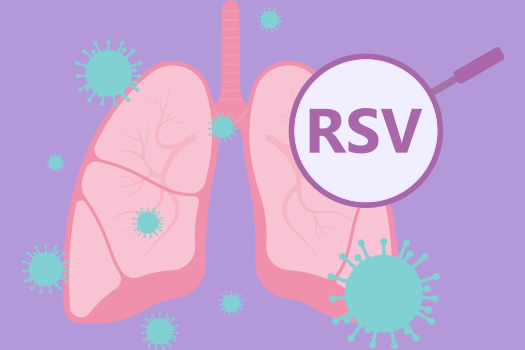
RSV stands for respiratory syncytial (“sin-sish-ul”) virus. It is a very common virus that affects most children under the age of 2. But unfortunately, it can cause very serious illness in young infants and adults over age 60.
RSV is transmitted in the air by cough or sneeze, and by direct contact with surfaces or skin (kissing a child!) and touching your face, mouth, eyes or nose with contaminated hands. Childcare centers are breeding grounds for RSV and children bring the infection home to family members. People are contagious one to 2 days before symptoms begin, and this can last 3 to 8 days, and even up to 4 weeks after symptoms are gone.
RSV is most prominent in fall and winter, and it feels like a common cold: runny nose, cough, sneeze, headache, fever, decreased appetite; infants may be irritable, have decreased feeding and activity. The danger is the development of pneumonia or bronchiolitis (another lower respiratory infection) which may require hospitalization. Also, symptoms may not come all at once. LOOK OUT FOR wheezing, difficult breathing, blue coloring, and high fever as these are signs of severe disease. There are lab tests your doctor may order if indicated.
WHO GETS IT—Anyone can get it, but the concern is in infants under 12 months, people who have a lowered response to infections (patients with cancer, asthma and other chronic lung diseases, heart disease, in nursing homes and on certain medications) and the older population. People in these categories are at higher risk of hospitalization and death from severe respiratory illnesses.
TREATMENT AND PREVENTION—Symptomatic treatment with over-the-counter medications to lower fever (NO aspirin in children) and decongestants, increased fluid intake, rest and chicken soup will be adequate for most people. Isolation is not necessary, but diligent handwashing, covering your mouth/nose, keeping surfaces clean and not sharing eating/drinking utensils are important.
Vaccines are available for adults and in pregnancy, if recommended by your doctor or pharmacist and are paid for by all insurance companies once a year. An RSV antibody is given to newborns born in high infection season if their mothers did not get vaccinated, and children 8 months to 19 months can get antibodies if they are in a high-risk group. All these vaccines are approved by the CDC.
So there you have it. Please keep yourselves safe and healthy!
Dr. Lan Hodges
Ref: cdc.gov
